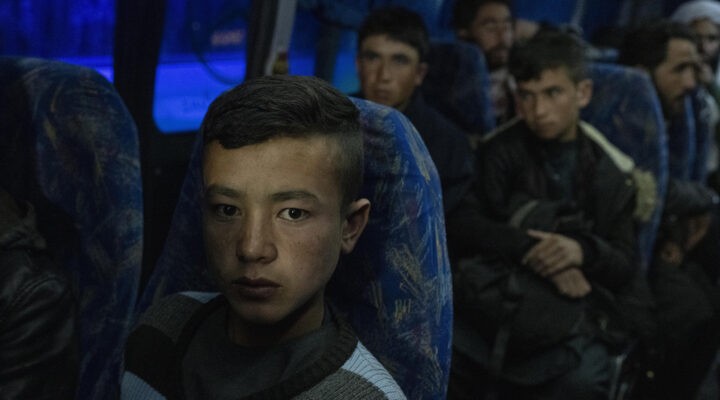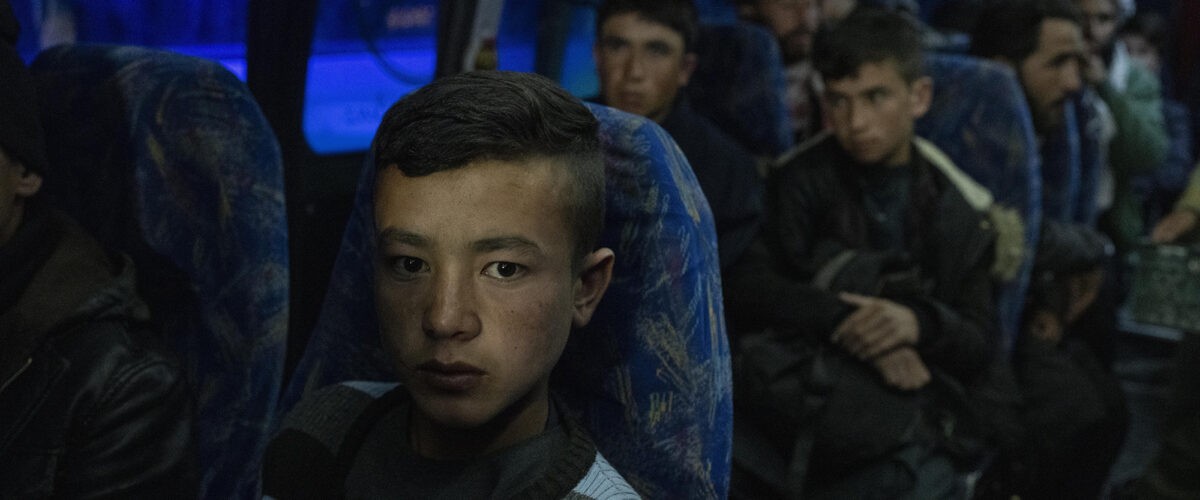One of the unforgettable images of 2021 is Afghan citizens clinging to a moving plane at the Kabul airport in a desperate bid to escape from the country after the fall of Afghanistan’s government to Taliban fighters.
Some of the desperate Afghans succeeded in fleeing the country to countries like the United States, where they were welcomed eagerly by Americans of different persuasions.
While that generosity has been much lauded by many, a group of Afghans already in Houston decided to form their own committee to mobilize resources and play a role in welcoming and assisting their fellow countrymen settle in the fourth-largest city in America. The organization is called Houston Afghan Committee and comprises about 20 members, one of whom is Mohammed Ibrahim Mojaddedi.
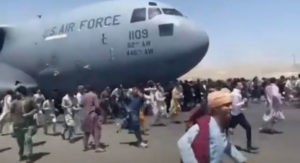
Desperate Afghanis run alongside a U.S. Air Force plane at the Kabul airport Aug. 16. (Screenshot from YouTube video)
Mojaddedi said he and his colleagues decided to form the committee as a way to help bring succor to fellow Afghans forced by circumstances to flee their country. They know by personal experience that adjusting to life in a new country isn’t easy.
Mojaddedi recalled his own early years as an immigrant in the U.S. in the 1970s, and how, with his brother, he battled challenges. Now, he and his colleagues in Houston Afghan Committee want to do all they can to make life easier for today’s new arrivals.
He acknowledges the chaos of the mass exodus from Afghanistan but knows that even amid that backdrop, resettling in a country with more freedoms and security still can be hard.
So one of the first things his group did was find another Afghan man in Houston to assist them with warehouse space. That warehouse, located in Rosenberg, a small city within the metropolitan Houston area, now serves as the relief center for the Houston Afghan Committee, where donations for distribution to the new immigrants are stored and processed.
Items donated include clothing, furniture, mattresses, sanitary materials and electronics. As of Dec. 19, about 200 families had been assisted by the center.
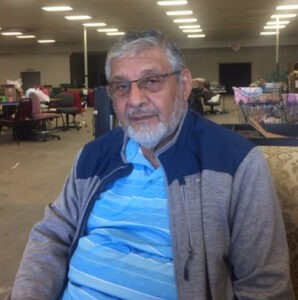
Mohammed Ibrahim Mojaddedi
In a mid-December interview with BNG, Mojaddedi spoke about this work and more, including his own story of coming to live in the U.S. as well as the tragedy he has had to live with.
What does the Houston Afghan Committee stand for?
We are a coalition of Afghans that came together when we heard what’s going on in Afghanistan and that some (Afghans) will be coming to Houston. We heard different stories about what the (U.S.) government was going to do or not do. We heard about people without visas coming in and that this category of people are not going to be getting any help from organizations that help to resettle immigrants. When we heard that, we said, “What can we do?”
But the impression many had was that the government was helping to bring them in because of the situation in Afghanistan and that they would be getting help in terms of resettlement.
“We heard at first that those people are not going to get any kind of help from the government. So we decided as a community to think of what we can do to help.”
You see, at first we heard that the people who worked with the Americans and foreign agencies in Afghanistan were going to get help. But there are some people who came with nothing, they were lucky to get in the plane and they came. We heard at first that those people are not going to get any kind of help from the government. So we decided as a community to think of what we can do to help these people to settle here because leaving a country in that situation to come to a new environment, culture, everything … some of these people don’t even speak English and some of them can’t read and write. So we thought, what can we do to help. Then we reached out to this friend of ours that has this (warehouse) and asked him whether we could use his place to collect donations and distribute. With an open heart, he said yes, go and do whatever you can. His name is Amin Noor.
Where’s he from?
He’s from Afghanistan. He helped us to establish this center. We publicized it on Facebook and reached out to some of the people we knew could help. We told them our plans and asked for their help, and they responded with kindness and love as you can see what we’ve got here. These are people from Islamic communities, Hindu communities, Indians, Spanish people. Some American companies like Randall’s supermarket helped us. Some of these people are persons we know and reached out to.
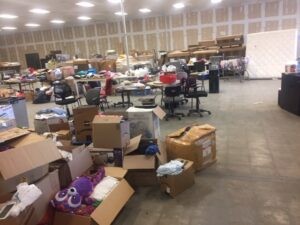
Donations being sorted in the warehouse.
However, there are people I don’t know who came to the warehouse to donate things. So, from this warehouse, we donate clothing and others to the agencies assigned with resettling the people (immigrants), to distribute to people (temporarily staying) in hotels prior to being resettled in apartments.
(Apart from NGOs assisting to resettle the immigrants), we have agencies like Islamic Society of Greater Houston and also Annissa. They are very generous also. We send them names of families, and they issue food cards, according to families, to enable them to buy food and stuff like that. Some other people bring us food. We don’t keep food in this facility, but we can accept the food, then call some other people to come to pick it up and distribute to the families. For families that moved from the hotels to apartment, for some people, we are able to help with things like furniture, essentials for the kitchen, clothing, blankets, sanitary items. We have helped close to 200 families. We delivered the materials to them.
“I’m really humbled that I and my colleagues reached out to some friends and they responded with an open heart, spent their own money, fueled their trucks in moving things like furniture or boxes to the houses of those who need them.”
I’m really humbled that I and my colleagues reached out to some friends and they responded with an open heart, spent their own money, fueled their trucks in moving things like furniture or boxes to the houses of those who needed them. There were times we did like 10 to 15 deliveries in one day. Permit me to use this opportunity to say that if anybody chooses to donate relief materials, they can reach out to us through my phone number: (832) 419 2624 or through Mr. Bayan, who’s part of us. His number is (832) 680-9069.
In terms of membership, how large is the Houston Afghan Community
We are about 20.
Do you get paid for your services?
We are all volunteers. Nobody gets paid for it. The members spend their own money. They bring lunch for everybody. We do it for the love of God and humanity. As you know, we all came from another part of the world. And then we remember the time that we came to this country. The time that I came to this country, it was different.
Different in what way?
People cared about each other. Me and my brother landed in New York, walked outside and the taxi driver was from Afghanistan. We didn’t speak English. So, we know the struggle immigrants face. I know the struggle me and my brother endured because at that time there were not many Afghans to help. He and I, every day, five days a week, because we had to go to school for English and all that, we got up at 5:30 in the morning and by 6 a.m., were walking seven miles in Maryland and you can imagine what it looked like during winter. It wasn’t easy, and right now it’s a lot harder because the people coming have no way of knowing what to do. Some of them don’t know anybody here. My brother and I arrived in America single, so we didn’t care if we went hungry, but when you come with a one- or two-months-old child, it’s different.
Did you come with your parents then?
No. You see, my father sent us over to the U.S. to acquire higher education. We came to America to go to school and to go back. That’s what the plan was. I came in January of 1976, but unfortunately in 1979, we know what happened in Afghanistan. At that time, when the communist government came, they took my family to jail, every one of them: men, women, children, everybody: my father, younger brother, my cousin, uncle, everybody. They killed 72 people in my family, including my brother, uncle, cousin.
My father and my mother and sister were there with my brother when they took my youngest brother. My father was sick. He was under house arrest, and they wouldn’t let him go to the doctor, so he had a stroke and passed away. At that time, I just got married and had a baby. At that time, minimum wage was not that high, but we managed to bring my mother and sister (to the U.S.) They had to walk from the mountains of Afghanistan to go to Pakistan and from Pakistan, we were able to bring them over here. At that time, I lived in Denver. When they came to Denver, they stayed with us. I later moved to Houston. My younger brother came to Houston but didn’t like it and moved to California. When I came to Houston, there were maybe 10 to 15 Afghan families over here in 1983, but now our community has grown a lot larger.
Are you in thousands now?
Oh, we are, we are way over a thousand.
What about your wife? Where’s she from?
My wife was born and raised in New York. She’s an American. We got married in 1978, and we are still together. She comes here. (she’s a member of the Houston Afghan Committee)
She is white?
She’s white and my son in-law is Black. In our religion, white, black, we are all the same. God created us all. The same way that he created flowers different, he created human beings different. So color doesn’t matter.
Anthony Akaeze is a Nigerian-born freelance journalist currently living in Houston.
Related articles:
This agency already has resettled 600 Afghan refugees in Houston
Afghan refugees are being screened safely, security experts assure governors
Supporting the influx of Afghan refugees is bringing divided Americans together
Broad support for helping Afghan refugees does not uniformly extend to all refugees

